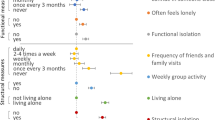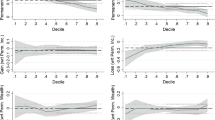Abstract
Gift expenses escalated in China in the last decades with rapid economic growth and account for a substantial share of household expenditures. Rising gift expenses signal good friendships and facilitate reciprocity, which may enhance one’s subjective wellbeing. However, increasing gift giving may also exacerbate the financial burden of households and thus has adverse welfare implications. This study examines how escalating gift expenses impact individuals’ subjective happiness by using data from the China Family Panel Studies. Findings suggest that an increase in the ratio of gift expenses to household income can significantly decrease one’s subjective happiness by crowding out other consumption items and harming psychological health. Overall, this study offers new insights into informal social networks maintained by gift giving, which may adversely affect household welfare.


Data source: China Family Panel Studies (CFPS 2010, 2014, 2018)
Similar content being viewed by others
Notes
Our previous estimators likely suffer from sample selection bias, i.e., attrition bias, if the subsample of these dropped observations is not randomly selected from the entire population. Firstly, to test this potential bias we use standard Heckman selection correction methods, where we identify the selection term of being repeatedly surveyed using household characteristics (such as gender, age, hukou status, political status, marital status, education, household wealth and number of children). We find that the coefficient of the estimated ρ (i.e., the correlation of the two error terms) is quite small (0.028) and its p value is almost equal to 0.9, indicating a weak evidence of sample selection bias. We also divide the full sample into two subgroups based on whether the respondent participated in all rounds of surveys, and then look at whether there is significant difference in happiness between these two subgroups, holding other thing being equal. Results by regressing happiness on RGI and Repeated, which is an indicator variable that equals to one if the respondent repeatedly participated in all three rounds of surveys and equals to zero otherwise, while controlling for a number of household characteristics, county dummies and year dummies, show that the coefficient of Repeated is not significant (p value = 0.345). This finding reaffirms that attrition poses little threat to the baseline estimators.
In the CFPS, the respondents are asked the following multiple choice question about their happiness: Are you happy?
In the CFPS, the respondents are asked the following multiple-choice question about their gift expenditure: What was the total value of the gifts/cash gifts given out last year?
In this study, the RGI is measured at the household level, and happiness and some control variables are measured at the individual level. Therefore, such cross-level analysis may induce bias in the main findings. To ease this concern, we restrict the sample used in the analysis to household heads and their spouse, who are mainly responsible for supporting the family (Wang 2012). They would feel more pressure than other family members when the family cannot or struggles to make ends meet.
The total effect refers to the effect of the independent variable RGI on the dependent variable Happiness without the mediating variable Household consumption. The direct effect refers to the effect of the independent variable RGI on the dependent variable Happiness when controlling for the mediating variable Household consumption. The indirect (mediating) effect of Household consumption refers to the effect of the independent variable RGI on the dependent variable Happiness through the mediating variable Household consumption.
References
Aknin, L. B., Dunn, E. W., Proulx, J., Lok, I., & Norton, M. I. (2020). Does spending money on others promote happiness?: A registered replication report. Journal of Personality and Social Psychology. https://doi.org/10.1037/pspa0000191.
Arampatzi, E., Burger, M. J., & Novik, N. (2018). Social network sites, individual social capital and happiness. Journal of Happiness Studies, 19(1), 99–122. https://doi.org/10.1007/s10902-016-9808-z.
Berggren, N., Bjørnskov, C., & Nilsson, T. (2018). Do equal rights for a minority affect general life satisfaction? Journal of Happiness Studies, 19(5), 1465–1483. https://doi.org/10.1007/s10902-017-9886-6.
Brown, P. H., Bulte, E., & Zhang, X. (2011). Positional spending and status seeking in rural China. Journal of Development Economics, 96(1), 139–149. https://doi.org/10.1016/j.jdeveco.2010.05.007.
Bulte, E., Wang, R., & Zhang, X. (2018). Forced gifts: The burden of being a friend. Journal of Economic Behavior & Organization, 155, 79–98. https://doi.org/10.1016/j.jebo.2018.08.011.
Chan, A. K. K., Denton, L., & Tsang, A. S. L. (2003). The art of gift giving in China. Business Horizons, 46(4), 47–52. https://doi.org/10.1016/S0007-6813(03)00051-X.
Chen, X., Kanbur, R. K., & Zhang, X. (2011). Peer Effects, Risk Pooling, and Status Seeking: What Explains Gift Spending Escalation in Rural China?. Working Paper.
Chen, X., & Zhang, X. (2012). Costly Posturing: Relative Status, Ceremonies and Early Child Development in China.
Clark, T. S., & Linzer, D. A. (2015). Should I use fixed or random effects? Political Science Research and Methods, 3(2), 399–408. https://doi.org/10.1017/psrm.2014.32.
Devine, J., Hinks, T., & Naveed, A. (2019). Happiness in Bangladesh: The role of religion and connectedness. Journal of Happiness Studies, 20(2), 351–371. https://doi.org/10.1007/s10902-017-9939-x.
DiPasquale, D., & Glaeser, E. (1999). Incentives and social capital: Are homeowners better citizens? Journal of Urban Economics, 45(2), 354–384. https://doi.org/10.1006/juec.1998.2098.
Dunn, E. W., Aknin, L. B., & Norton, M. I. (2008). Spending money on others promotes happiness. Science, 319(5870), 1687–1688. https://doi.org/10.1126/science.1150952.
Foye, C. (2017). The relationship between size of living space and subjective well-Being. Journal of Happiness Studies, 18(2), 427–461. https://doi.org/10.1007/s10902-016-9732-2.
Hajdu, G., & Hajdu, T. (2016). The impact of culture on well-being: Evidence from a natural experiment. Journal of Happiness Studies, 17(3), 1089–1110. https://doi.org/10.1007/s10902-015-9633-9.
Hu, M., & Ye, W. (2020). Home ownership and subjective wellbeing: A perspective from ownership heterogeneity. Journal of Happiness Studies, 21(3), 1059–1079. https://doi.org/10.1007/s10902-019-00120-y.
Jaunky, V. C., Jeetoo, J., & Rampersad, S. (2019). Happiness and consumption in mauritius: An exploratory study of socio-economic dimensions, basic needs. Luxuries and Personality Traits. Journal of Happiness Studies (Forthcoming). https://doi.org/10.1007/s10902-019-00178-8.
Keng, S.-H., & Wu, S.-Y. (2014). Living happily ever after? The effect of taiwan’s national health insurance on the happiness of the elderly. Journal of Happiness Studies, 15(4), 783–808. https://doi.org/10.1007/s10902-013-9449-4.
Lin, L.-H. (2011). Cultural and organizational antecedents of Guanxi: The chinese cases. Journal of Business Ethics, 99(3), 441–451. https://doi.org/10.1007/s10551-010-0662-3.
Lu, L. (2001). Understanding happiness: A look into the Chinese folk psychology. Journal of Happiness Studies, 2(4), 407–432. https://doi.org/10.1023/A:1013944228205.
Meisenberg, G., & Woodley, M. A. (2015). Gender differences in subjective well-being and their relationships with gender equality. Journal of Happiness Studies, 16(6), 1539–1555. https://doi.org/10.1007/s10902-014-9577-5.
Park, S.-Y. (1998). A comparison of Korean and American gift-giving behaviors. Psychology and Marketing, 15(6), 577–593. https://doi.org/10.1002/(SICI)1520-6793(199809)15:6%3c577::AID-MAR6%3e3.0.CO;2-3.
Park, S. H., & Luo, Y. (2001). Guanxi and organizational dynamics: Organizational networking in chinese firms. Strategic Management Journal, 22(5), 455–477. https://doi.org/10.1002/smj.167.
Townsend, R. M. (1994). Risk and insurance in village India. Econometrica, 62(3), 539. https://doi.org/10.2307/2951659.
Wang, H., Cheng, Z., & Smyth, R. (2019). Consumption and happiness. The Journal of Development Studies, 55(1), 120–136. https://doi.org/10.1080/00220388.2017.1371294.
Wang, R. (2016). Who should I share risk with? Gifts Can Tell: Theory and Evidence from Rural China. https://doi.org/10.2139/ssrn.2718104.
Wang, S.-Y. (2012). Credit constraints, job mobility, and entrepreneurship: Evidence from a property reform in China. Review of Economics and Statistics, 94(2), 532–551. https://doi.org/10.1162/REST_a_00160.
Weng, Y., & Xu, H. (2018). How guanxi affects job search outcomes in China? Job match and job turnover. China Economic Review, 51, 70–82. https://doi.org/10.1016/j.chieco.2018.05.006.
Wu, X. (2013). The power of social capital in school choice in a Chinese city. Australian Journal of Education, 57(1), 48–59. https://doi.org/10.1177/0004944112468701.
Yang, Y., & Paladino, A. (2015). The case of wine: Understanding Chinese gift-giving behavior. Marketing Letters, 26(3), 335–361. https://doi.org/10.1007/s11002-015-9355-0.
Acknowledgements
The authors wish to thank the editor Stephanie Rossouw, the associate editor Martijn Hendriks, and two anonymous referees for comments that considerably improved the quality of this paper. This study was funded by the Natural Science Foundation of Guangdong Province (No. 2020A1515010359; No. 2019A1515011921), the National Natural Science Foundation of China (No. 71774144; No. 71902072; No.72074097), the Major Research Project of Philosophy and Social Sciences of the Ministry of Education (No. 18JZD033), and the Fundamental Research Funds for the Central Universities (Jinan University, No. 19JNQM19).
Author information
Authors and Affiliations
Corresponding author
Ethics declarations
Conflict of interest
The authors declare that they have no conflict of interest.
Ethical Approval
This article does not contain any studies with human participants performed by any of the authors. The data we use in this study come from the China Family Panel Studies (CFPS), a nationally representative household survey carried out by the Institute of Social Science Survey (ISSS) of Peking University. This survey can be publicly downloaded at its official website (http://isss.pku.edu.cn/cfps/download/login).
Informed Consent
Informed consent was obtained from all individual participants included in the study.
Additional information
Publisher's Note
Springer Nature remains neutral with regard to jurisdictional claims in published maps and institutional affiliations.
Rights and permissions
About this article
Cite this article
Hu, M., Xiang, G. & Zhong, S. The Burden of Social Connectedness: Do Escalating Gift Expenditures Make You Happy?. J Happiness Stud 22, 3479–3497 (2021). https://doi.org/10.1007/s10902-020-00341-6
Accepted:
Published:
Issue Date:
DOI: https://doi.org/10.1007/s10902-020-00341-6




